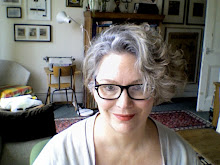the end of the poem

Paul Muldoon must have seen me coming, when he named his series of Oxford lectures - which I have now, finally, after receiving them in the post in December, at long last started reading. Oh, yes: in my own small way I have myself been living the end of the poem.
Not only have I not written anything like a poem since the summer, when I was not working & had time & had the leisure even to think of myself as an artist; but I cannot imagine now writing one. Not that's any good. Not and someone publishing it - I just feel those days are over. I feel beleaguered, there's no mental space left; every time I do have an idea it turns to platitudes as soon as I try to articulate it. It's like one of those skulls in the movies.
I do know this is temporary and is one of the mythical syndromes that in fact serve to define one as an 'artist'; but there's no one to chivvy me out of it, this has been a year or more in the making. The main person who had faith in me is dead, and all the others have melted off into other little circles or what-have-you. And everyone is busy! (Not unlike your correspondent, I know, & of course that is part of the problem. LORD, for a decent trust fund!)
ANYWAY! One bloke who really does NOT have this problem is Paul Muldoon. My golly. Mr Prolific and not one to stand back waiting for other people to cheer him on, not that he's short of that either.
So I'm reading his Oxford lectures, collected up into a delicious Faber hardback called The End of the Poem, a series title which positively invites a Muldoonian exploration of all the meanings and applications of that one three-letter word: "End". He may as well have called his book The Word of the Poem, or The End of the Word. The Be-all and End-all of the Word. It's like literary criticism as written by an etymological dictionary. In the nicest possible way I say that.
It's also like an act of archaeology, in the way it categorises its shards (sic) of meaning, tweezes out the strings of code that have worked their way like worms into poems. I'm only on the second essay, which is quite brilliant - glittering, even - certainly dazzling. (There's a lovely string of forbidden adjectives for you!) It's a reading of a poem by Ted Hughes, from Birthday Letters, about an episode with Marianne Moore regarding Sylvia Plath. From this reading Muldoon extracts a whole civilisation in which both Ted and Sylvia were the emissaries of a conquering monarch, trained in the use of the customs and practices of the conquered nation, and Marianne Moore becomes a slave. Or worse: a piece of furniture. And a penitent. Amd while Muldoon makes a point about the true reading of this poem being impossible without quite extensive knowledge of many biographical and other details (including a highly specific alertness to the works of Harold Bloom, the combative American critic), this erudite reading is presented to us with such flourishes that one almost feels the need to undo ribbons.
This book is already acting on me like a tonic, though admittedly one which also says on the bottle, "You cannot do this!" It is beginning, just beginning, to remind me of the freshness of poetry itself, the news that stays news, the thing that really is unearthed in archaeological sites, whose very name is based on the ancient and necessary activity of making.
In the end is the beginning. These two elements are too closely related for it to be forgotten. So it becomes clear once again to Ms Baroque, who got her own name from the ancient and necessary act of - well - probably of cramming the ideas and words in until the poem pops under the pressure, that one's "social-artistic" life is only one little thing. That the faith of my dead friend is something I will in any case always have: he always was one of the true peers. And that the true, important peer group is in fact not the people you know but the ones who went before you: the people you know are simply your colleagues, and as such probably work in a different department.














 the Woodstock edition of
the Woodstock edition of 














